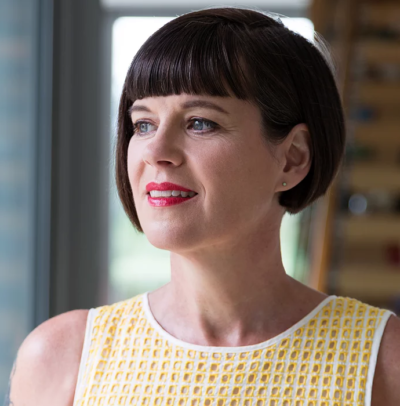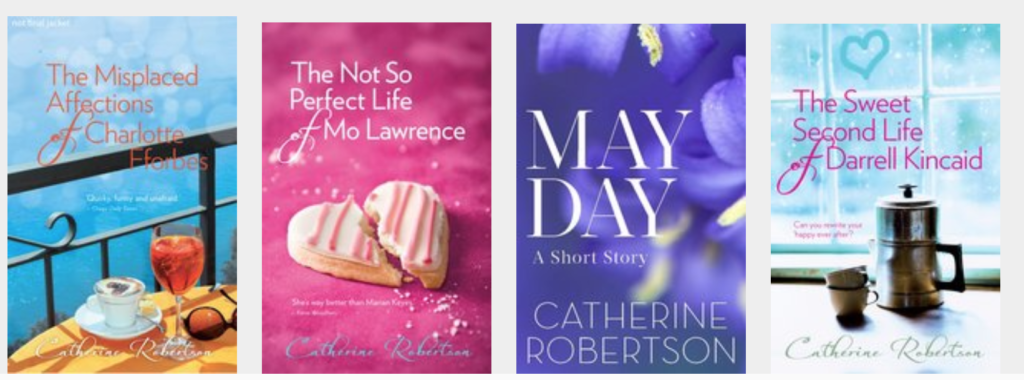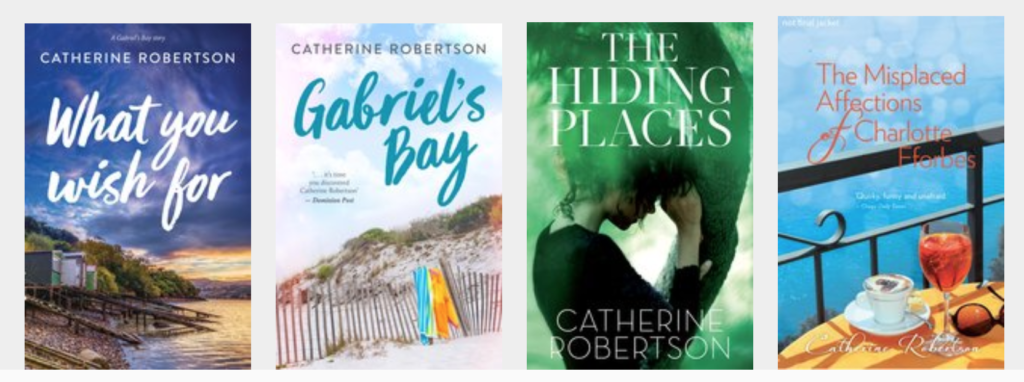
Catherine Robertson – Writing a Bestseller
I met Catherine Robertson at a short-fiction workshop at the International Institute of Modern Letters when I was on a working holiday in the Land of the Long White Cloud. I don’t know how the others in the workshop felt about their time there, but I remember thinking, “This is it. This is why I took such a meandering path and made seemingly senseless choices…I’m meant to be alive at this moment, sitting in a circle with 12 intelligent and creative people who value creative expression as much as I do, and damn this view over Wellington Harbour is amazing.” The 13 of us in the room, 12 Wellington-based emerging writers and workshop convenor Arda, from the Iowa Writers Workshop, came from all walks of life. Some of us were from different parts of the world and many of the New Zealand participants were from other cities and towns in NZ. It was the first time as an adult that I felt I had permission to write fiction. Since the workshop, over half of my classmates have established themselves as writers, teachers, filmmakers, poets and/and novelists.
Catherine, who was in advertising at the time, is now a full-time writer of bestselling novels.
Since our time together she has had seven novels published. Six of these novels have been number one best-sellers in NZ. The Hiding Places, her fourth novel, won the Nelson Libraries Award for NZ Fiction in 2015, the same year she returned to the IIML to complete an MA in Creative Writing. She is also a book reviewer for The New Zealand Listener, and a regular on Radio NZ‘s The Panel and Book Critic. Catherine has been invited to speak and chaired panels at numerous writers festivals, and is on the board of LitCrawl and on the Book Awards Trust.
Catherine’s latest novel What You Wish For is currently out in both New Zealand and Australia.
When you’re aiming to get published, rejections can make you want to give up. But if you do that, your non-published fate is sealed, so there’s really no choice but to take a deep breath and press on.
What are you working on at the moment? I’m gearing up for the third Gabriel’s Bay book – this one has a working title of Spellbound, after the Split Enz song, and it will be about how we can get sucked into beliefs, causes, groups, cults, gangs, etc until we lose the ability to think for ourselves. Hope to have it done by September (touch wood, rub rabbit’s foot, spit into a chalk circle).
When I first met you in Arda‘s short fiction workshop you were in advertising and had yet to publish your first novel. You’ve written so many novels since then! Was The Sweet Second Life of Darrell Kincaide, your first published novel, your first full-length manuscript? I have written seven novels since then! I know, can’t believe it either! LOL. And no, The Sweet Second Life of Darrell Kincaid was around the 8th full-length manuscript I’d written. I had a London agent interested in me but I never managed to write a book they were keen to sell – all the re-writes were the result of me trying to write the book they wanted. They dumped me (nicely, but still) in late 2008, and I thought about giving up but decided to press on. I’d learned a lot from their feedback, so I put it into practice and wrote the first draft of Sweet Second Life, pitched to other agents in London at the start of 2010, and secured the one I work with currently, who is fab. She sold Sweet Second LIfe to what was then Random House NZ (now merged with Penguin), and to publishers in Germany and Italy.

What was the journey from workshop participant to a best-selling author like? Hard work – but most of that is really emotional labour. When you’re aiming to get published, rejections can make you want to give up. But if you do that, your non-published fate is sealed, so there’s really no choice but to take a deep breath and press on. It’s a form of magical thinking, but necessary!
You’re a best-selling author, Pip Adam [another writer from our workshop] is now an award-winning author, and of course, there’s Booker prize-winner Eleanor Catton who also came out of the IIML. What is it about that place that produces such high-caliber writers? I don’t rate myself in the category of Pip or Eleanor, but the IIML courses I’ve done – the Short Story workshop (2005/6) and the MA in Creative Writing (2015) helped me define what kind of writer I am, my strengths and weaknesses, and my personal tastes and preferences. The more you write, the more you come into yourself as a writer. I think the IIML helps set you more confidently on your path.
What made you enter the MA program at IIML given that you were already a published writer? Writing is so lonely! I didn’t have writer friends, or a group, so I did the MA program to spend a year working with other writers, with the hope that we might form a group afterwards – which we have, still going (and one of our IIML short story workshop [alumni] is in it, Fiona). I also wanted a break from publishing – sounds weird considering most people do the course to become published, but I wanted to feel free to experiment, push myself to try new ways of writing and structuring work. I did and thoroughly enjoyed it, too.
What advice do you have for emerging writers who are pitching their work to publishers and agents? (a) Only pitch to publishers or agents who are accepting new authors and who publish/represent work like yours; (b) Pitch to ALL publishers or agents who fit the above because it’s a numbers game. Say you’re sending your work wide in your submission (c) Know where your work fits in the market. Even if you’re writing out-there crazy-arse experimental fiction, publishing is a business and publishers find books they can categorise, or at least compare to other books, easier to sell. You need to know your book’s genre (pick one, don’t pitch it as a crossover), and cite other out-there crazy-arse experimental fiction authors whose readers might also enjoy your book; (d) Follow any submission guidelines to the letter. Keep your submission brief, professional in tone, and proof it SUPER carefully.
Do you have a regular writing routine? What does it look like? When I’m writing, I treat it like a job, putting in a good 6-7 hours per day. I start around 8.30am and will have short stretch and tea breaks every 60-90 minutes, because they’re good for mind and body. I check my email first thing and respond before I start writing, and then I turn my email off (I also turn off any internet notifications). I check email again at lunchtime, but off it goes until the end of the day. I usually quit around 3.30pm/4pm and walk the dogs. I have one day off a week where I cram in all my meetings and appointments, and I usually take Saturday off, and write on Sunday mornings. I don’t do this all year because it would kill me and I’d lose my family and friends – for a 100K word novel, I allow 60-70 full days of writing (around 1500 words a day) spread over a 4-6 month period. Best time of year for me is March-September.
You were selected to represent NZ at the Frankfurt book fair. What happens at this fair? Frankfurt is a trade fair, not a literary festival – so writers don’t usually go, unless they’re representing themselves. But every year, there is a country of honour, and in 2012 it was New Zealand. We had our own area, with panels of writers, and lots of media coverage. I got to go because my first two novels had been translated into German. Lucky timing on my part! It was an amazing experience. The space they hold the fair in is HUGE – 20 minutes minimum to walk on travelators from one end to the other. And I got to meet a bunch of famous NZ writers, who were all very kind.
Your latest book will be translated into French. Do writers work closely with translators? My fourth book, The Hiding Places (2015), was translated into French, and I’ve had nothing to do with any of the translations! I guess if they struggled with a phrase or idiom, they might email me, but that’s not happened yet.
Do you have an agent? If so, did you get one after you had your first book published? I do have an agent – who is based in London, in one of the big literary agencies there. I’ve been working with her since 2010 and just adore her. She’s sold my books overseas – and my latest book, What You Wish For, is in Australia for the first time. I would not have got any of the overseas sales if it hadn’t been for her. She negotiates contracts on my behalf, which is excellent because I’ve heard terrible tales of authors signing away rights because they didn’t know any better.
Your favourite writers? I write humorous fiction, so my favourite writers are almost all humorists, too: Stella Gibbons, Sue Townsend, Nancy Mitford, Jane Austen (yes, she’s very funny), Terry Pratchett, Richmal Crompton and PG Woodhouse. But I love Mervyn Peake’s Gormenghast trilogy, and Susan Cooper and Ursula Le Guin’s fantasy YA novels. My favourite NZ humorous writer is Danielle Hawkins. And I’m a sucker for Lee Child’s Jack Reacher novels.
Favourite character? Steerpike in Mervyn Peake’s Titus Groan and Gormenghast: ambitious and cruel but also understandably so – a wonderfully complex and poignant villain.
What’s next? Hope that I can get the third Gabriel’s Bay book out early next year. Wish me luck and uninterrupted writing time!
Read an extract from Catherine’s latest novel What You Wish For here.
Catherine’s website: https://www.catherinejrobertson.com/ | Follow Catherine: https://www.facebook.com/catherinejrobertson.author/ | Twitter: @CJRauthor | Instagram: @catherinerobertson11


